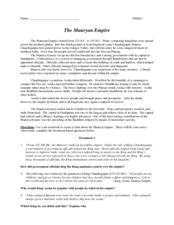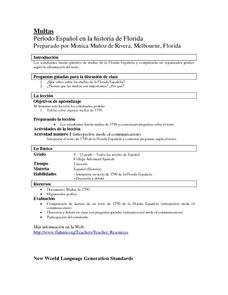Curated OER
True Crime
Young scholars discuss reasons for the increase in violent crime across the country. They examine the factors to which increases in violent crime can be attributed. Students brainstorm consequences of the forces that have led to the...
Facing History and Ourselves
We and They, the Armenians in the Ottoman Empire
Learners examine World War I war crimes. For this world history instructional activity, learners use primary and secondary sources to research and understand the action taken by the United States during the Armenian Genocide. Learners...
Curated OER
Roaring Twenties: Prohibition and Organized Crime
Students take a closer look at the Roaring Twenties. In this Prohibition and organized crime lesson, students watch "The Untouchables," and respond to the provided discussion questions about the film. A permission slip is provided as well.
Curated OER
The Crittenden Conway Duel
Young scholars explore primary and secondary sources. For this primary and secondary source lesson, students investigate a crime scene. Young scholars search for evidence around the classroom and evaluate their findings. Students write a...
Curated OER
A Civil Action
Students explore the roles of law enforcement officials, the news media, and civilians in crime prevention and criminal apprehension. They envision ways to build and strengthen community partnerships to address concerns about crime.
Curated OER
Who Are the Arab Americans?
Students explore the concept of diversity. In this Teaching Tolerance lesson, students take a quiz titled "Who Are the Arab Americans?" and then use the quiz as a lens through which to discuss misperceptions regarding Arab Americans....
Mississippi Department of Archives and History
Protesting Violence without Violence
The ultimate legacy of Emmett Till's violent death is its role in the non-violent roots of the Civil Rights Movement. A lesson compares contemporaneous articles with the lyrics of Bob Dylan's "The Death of Emmett Till" and prompts...
Curated OER
Do We Need a Permanenet International Criminal Court?: War Crimes, Violence, International Law and Politics, Nuremberg
In this lesson, young scholars explore the history, relevance and current application of international tribunals for war crimes. Students look at cases from the Nuremberg trials, Tokyo trials and the Bosnian War.
Curated OER
The Armenian Genocide: The American Ambassador in Constantinople
Students analyze America's reaction to the Armenian Genocide. They write a journal response, read and discuss text, compare/contrast reactions around the world to the Armenian Genocide and the genocide in Rwanda, and write an essay.
Curated OER
Slave Auctions in South Carolina
Students examine primary sources in the form of auction records, create frequency charts, graphs and diagrams that they analyze to anwer questions followed by the writing of a paper that demonstrates their comprehension of the lesson.
Curated OER
Urban Growth in America
Students examine urban growth in America. In this urbanization lesson, students watch segments of the Discovery video "Urban Growth in America." Students conduct further research pertaining to the industrial revolution, New York City's...
Facing History and Ourselves
Analyzing Historical Evidence
High schoolers examine World War I war crimes. In this world history instructional activity, students use primary and secondary sources to research and understand the systematic nature of the Armenian Genocide. High schoolers reflect on...
Facing History and Ourselves
What is Justice After Genocide?
Students explore the meaning and implications of genocide. In this human rights lesson, students investigate the Aremenian genocide that took place in Turkey and the subsequent trials of the leader of the genocide held by the Turkish...
Facing History and Ourselves
American Responses to the Armenian Genocide
Young scholars examine World War I war crimes. In this world history instructional activity, students use primary and secondary sources to research and understand the action taken by the United States during the Armenian Genocide. Young...
Facing History and Ourselves
Emmett Till: Choosing to Remember
Mamie Till, the mother of Emmett Till and civil rights activist, believed that her son's murder was the last straw before public outrage over racial injustice spilled over into the Civil Rights Movement of the 20th century. A history...
Facing History and Ourselves
Justice After the Holocaust
Though there could be no true justice for the horrors of the Holocaust, many of those responsible for crimes against humanity were found guilty in the eyes of the law. Using primary and secondary sources in the 16th installment of a...
DocsTeach
Prohibition and Its Consequences
Organized crime and speakeasies ... just another day during Prohibition. An intriguing activity explores the world of Prohibition and its consequences on life in the United States. Scholars analyze primary sources and place them on a...
Judicial Learning Center
American Equality Milestones
Has equality always existed as an unalienable right in the United States? Use this worksheet to chronicle the history and progression of equality in major documents and speeches throughout American history. The graphic organizer asks...
Curated OER
The Mauryan Empire
Create a chart about the Maurayan Empire. Read the provided passage, make a chart, then analyze 3 excerpts. Questions need to be answered for each of the primary source excerpts. Making a reading chart is a good way to take notes!
Teaching Tolerance
Mass Incarceration as a Form of Racialized Social Control
Mass incarceration: A result of a tough stance on crime or racial discrimination, you decide. Academics explore the history and reasons behind mass incarcerations in the United States and its impact on ethnic communities. The...
Global Oneness Project
Communities on the Threshold of Change
Viewers of the short documentary Santa Cruz Del Islote consider how changes in climate and overfishing impact the life style of the 1,200 residents of a small island off the coast of Cartagena, Columbia.
Infobased Learning
Bloom's Literature: How to Write about Nineteen Eighty Four
A good prompt is hard to find, especially ones that encourage application, analysis, synthesis, and evaluation of a text. Help is here in the form of a prompt list for George Orwell's Nineteen Eighty Four that offers essay topics that...
Curated OER
Multas
Combine history and Spanish instruction with an exploration of descriptions of fines given in Florida in 1790. Partners read the brief text, fill out a graphic organizer about the crimes described, and interview each other about fines....
Curated OER
Why do so Many Young People Carry Knives?
Young scholars explore the rise in knife crimes in Great Britain. In this current events lesson, students research the noted websites to study knife laws, British trends, and knife history.

























